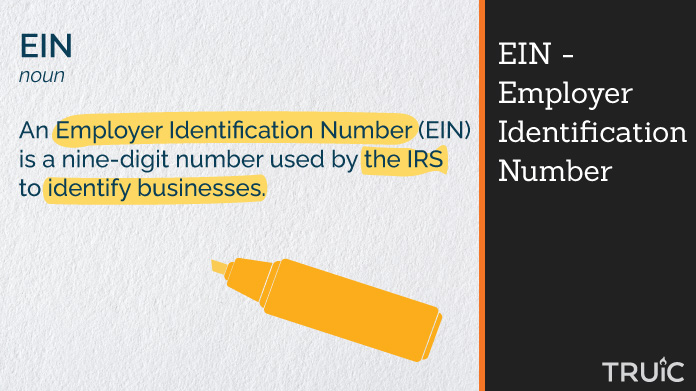Employer Identification Number (EIN)
An Employer Identification Number (EIN) is like a Social Security number (SSN) for your business. The Internal Revenue Service (IRS) uses EINs to identify taxpayers and keep track of a business’ tax reporting.
An EIN also may sometimes be referred to as a Federal Employer Identification Number (FEIN) or a Federal Tax Identification Number (FTIN).
It’s important to know if your business is required to get an EIN and the steps you’ll need to take to do so.
Topics:

EIN Meaning and Definition
An Employer Identification Number (EIN) is a nine-digit number used by the IRS to identify businesses.
An EIN is also referred to as a Federal Employer Identification Number (FEIN) or a Federal Tax Identification Number (FTIN).
Not all businesses need an EIN, but many do. As such, it may be a good idea to get one even if it isn’t required because it can offer several advantages.
Do I Need an EIN?
The IRS requires certain types of business structures to have an EIN while others don’t need one. The first thing to know is that you must obtain an EIN if you have employees. But, that’s not the only factor that will require you to get an EIN.
The following businesses are NOT required to have an EIN:
- Sole proprietorships with no employees that don’t file any excise or pension plan tax returns
- Single-member LLCs with no employees or excise tax liability
Even though an EIN isn’t required for those types of businesses, it may be a good idea to get one anyway. We’ll cover some of the reasons to get an EIN in the next section.
The following businesses are required to have an EIN:
- C corporations
- S corporations
- Multi-member LLCs
- Partnerships
- Nonprofits
- Trusts
- Sole proprietorships with employees
- Single-member LLCs with employees
Benefits of an EIN
Obtaining an EIN — even if it’s not required for your business — can provide several benefits. Specifically, an EIN can make it easier for you to:
- Open a Business Bank Account: Most banks require an EIN to open a business bank account.
- Hire Employees: If you plan to hire employees, you must obtain an EIN. And even if you don’t currently have any employees, getting an EIN now will save you some trouble if you decide to hire a few in the future.
- Maintain Your Corporate Veil: If you operate a single-member LLC, getting an EIN will provide a clear separation between your business and personal accounts so you can keep your personal liability protection.
- Prevent Identity Theft: If you use your SSN as a sole proprietor, you increase your chances of falling victim to identity theft.
You can learn more in our 7 Benefits of Getting an EIN article.
How to Get an EIN
The quickest and simplest way for taxpayers to get an EIN is to apply online via the IRS website, using the EIN Assistant.
If you prefer, you may apply for an EIN by fax or mail with Form SS-4. Faxed submissions should go to 855-641-6935. The address for mailed submissions is Internal Revenue Service, Attn: EIN Operation, Cincinnati, OH 45999.
When applying online, you must provide the following information:
- Your business structure type, such as limited liability company (LLC), corporation, or sole proprietorship
- Your business’ number of owners
- Your business location
- Your reason for applying for an EIN
- The “responsible party” for your business
International EIN Applicants
If you don’t have a SSN and you’re not a U.S. citizen, you can still get an EIN. Simply download and fill out Form SS-4. You can leave section 7b blank.
To submit your application, call the IRS at 267-941-1099 (NOT a toll-free number) Monday through Friday between 7 a.m. and 10 p.m. Eastern Standard Time. You also may apply for an EIN by fax at 304-707-9471.
EIN FAQs
Do I need an EIN if I’m self-employed?
You don’t need an EIN if you’re self-employed; you can simply use your Social Security number (SSN). But, some self-employed people choose to get an EIN in order to reduce their risk of identity theft.
Is there a difference between an EIN and a TIN?
No, there’s no difference between an Employer Identification Number (EIN) and a Taxpayer Identification Number (TIN). Both refer to the nine-digit number issued by the IRS for your business.
Is there a difference between an EIN and a FEIN?
No, there’s no difference between an Employer Identification Number (EIN) and a Federal Employer Identification Number (FEIN). An FEIN also may be referred to as a Federal Tax Identification Number (FTIN).
How do I look up my EIN?
It’s very easy to look up your EIN, and there are several ways to do so. First, the IRS will typically email or send you a physical letter confirming your EIN application. You also can check business documents, such as tax returns, to find your EIN printed there.
How do I look up another business’ EIN?
You can look up another business’ EIN by searching for the company on the U.S. Securities and Exchange Commission’s (SEC’s) EDGAR database.
How do I recover my EIN if I forget or lose it?
If you still can’t find your EIN by checking for a confirmation email or letter, or by identifying it on your business documents, you can simply call the IRS EIN Department at 1-800-829-4933 to speak with an IRS representative. The department’s hours of operation are Monday through Friday from 7 a.m. to 7 p.m.
What’s the difference between an EIN and a DUNS number?
An Employer Identification Number (EIN) is a nine-digit number issued by the IRS to keep track of a business’ tax reporting. A Data Universal Numbering System (DUNS) number is a nine-digit number issued by Dun & Bradstreet, a business analytics company. A DUNS number helps businesses create and identify their credit reports.